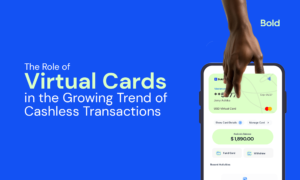
The world is rapidly moving away from cash and digital payment has become the order of the day. Digital transactions are becoming the norm and one of the tools that make it possible is the Virtual card.
The shift from cash can be seen across the globe, from tech-savvy continents like North America and Europe to developing markets like Africa. In Nigeria for instance, the Central bank’s cashless policy which was reintroduced via a circular to financial institutions on December 6, 2022 has caused a notable increase in digital transactions. Mobile payments in the country went up by 50% in 2022 alone, as people – individuals and businesses hopped on the cashless trend.
Virtual cards are simply digital versions of your physical debit and credit card. They are generated through financial platforms and can be used for online payments, just like your physical card. A virtual card comes with unique card numbers, expiration date and CVV – everything necessary to make purchases online.
The virtual card is just like your physical, plastic card but better and more convenient.
The advantage of virtual cards is that they are flexible, more secure and unlike the physical card, doesn’t take up space in your wallet. They can be used for a wide range of online transactions, from shopping on e-commerce platforms like amazon to paying for subscriptions on Spotify.
Virtual cards also offer a layer of protection against fraud. In the situation of unfortunately rampant fraud and cyber threat in the country, security is paramount for both individuals and businesses. Virtual cards provide a safer alternative to the physical card, especially when shopping online where the risk of fraud is higher.
Additionally, since virtual cards can be linked to digital wallets, streaming platforms and mobile apps, it’s possible to monitor transactions and detect suspicious activity quicker, and while physical cards can be lost or stolen, virtual cards can be easily deactivated from your mobile device.
Many fintech platforms have recognized the power of virtual cards and have integrated them into their repertoire. The Bold App is the leading fintech solution, providing its users with a seamless and secure way of handling digital transactions. With Bold’s Virtual Card, Nigerians can enjoy convenience when shopping online, paying for Dstv subscriptions and paying for international purchases without worrying about financial security. There are also notable platforms like Revolut, Opay, Chipper cash, Paypal, etc who have virtual cards in their offerings. These platforms, alongside Bold, are helping drive the cashless economy initiative while ensuring users have a secure, flexible and seamless way of managing digital transactions.
Change is not always easy, but as we look to the future, we see that the role of virtual cards in the envisioned cashless economy will only grow. With platforms like Bold leading the way, individuals and businesses can harness the benefits of the cashless economy without worries because fees are fair and transactions, secure.
